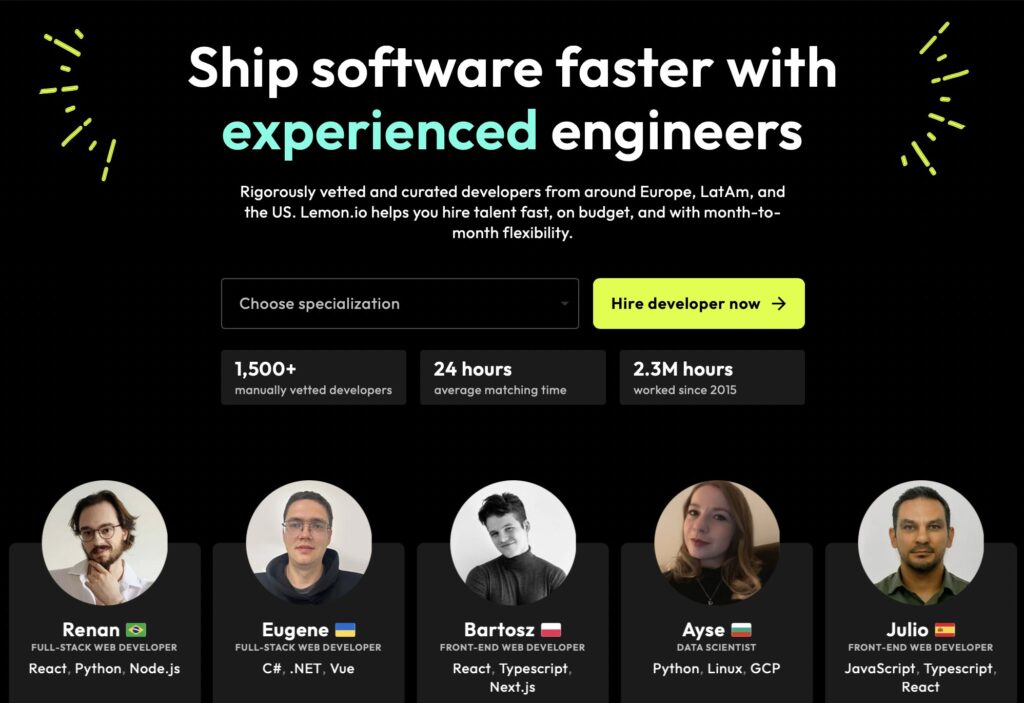Welcome to the developer marketplace, where “premium” is often just code for “we hope you won’t check the receipt.”
If you’re here, you’re eyeing Andela—or you’ve already run the obstacle course of its price tags, twelve-month handshake contracts, and the kind of “AI matching” that feels more like algorithmic speed dating. Maybe you signed up for global brilliance, only to find yourself on hold, wondering how $14,000 per month buys you so little follow-up or human interaction.
You’re not alone. Startups, scale-ups, and even big spenders are asking: is Andela’s platform really that much better—or just that much pricier? Is all that “world-class vetting” worth the opaque pricing and impersonal matching? Do you really need to lock in a developer for a year before you’ve even had a second date?
The good news: 2025 is loaded with alternatives. Some are boutique, some massive, but all promise what Andela can’t (or won’t): transparent pricing, flexible commitments, and customer support where a human might actually remember your name. Some can even get you from “we need help now” to “our dev started Monday” in less time than it takes Andela to return your NDA.
So let’s break it down. If you’re tired of the old pitch, craving developer quality without the sticker shock, or just want to know what your real options are—this is your no-fluff guide. We’ll cut through the handwaving, expose the gotchas, and drop in real-world reviews.
The Andela era is over. The “smart money” is already looking elsewhere. Ready to see who’s worth your trust (and your budget)?
Why People Are Pulling the Plug on Andela
If you’re reading this, you’ve probably hit the same walls other companies face with Andela:
- Price tag: $6,000 to $14,000 monthly, depending on dev’s expertise
- Contracts: 12-month minimums with no trial period or easy exit
- AI matching: Often feels random rather than strategic—mismatched skills, poor cultural fit
- Wait times: Weeks of back-and-forth just to see candidate profiles
- Support: Slow response times, impersonal service, and limited follow-through
It’s not complicated: the price is steep, the contracts are rigid, and the AI-driven matching is more “draw from a hat” than handcrafted. You pay enterprise rates, then get funneled through a process that feels indifferent—sometimes fast, sometimes a grind, and too often a black box.
If you need engineers this quarter (not next), a trial before a commitment, or someone who actually responds to emails, you’re not alone in looking for something better.
The Best Andela Alternatives in 2025
If tying yourself to twelve-month contracts and hoping for a human reply hasn’t worked out, you’re in luck. These platforms ditch the black-box pricing and put speed, transparency, and real support first.
Lemon.io: The Only Club Where “98% Rejection Rate” Is a Selling Point

Lemon.io sets the bar high and isn’t shy about it. Every developer faces in-depth checks—real projects, background vetting, live English interviews, and conversations with people who speak tech and spot real skill (not just pretty portfolios).
Only about 1.2% get in. The result? Mostly senior engineers from Eastern Europe who’ve built product, shipped code, and can own a roadmap (here’s how it works).
Matching is fast, but not rushed—you’ll usually meet candidates in a few days, sometimes up to two weeks (because we’d rather say “not this time” than toss you someone who isn’t a fit). Rates start at $45 and cap at $120 per hour. No deposits. No monthly fees. No games with pricing or contracts.
You get transparency, quick replies, straightforward feedback, and a human who answers when you have a question. Most clients hire the first dev they meet. The only surprise? How easy honest hiring can feel when someone respects your time.
Buyers say it best: G2 reviews are full of comments about Lemon.io’s “shockingly fast” process and “phenomenal experience with guarantees.” Teams highlight how the process is “organized fast,” interviews are set up quickly, and several mention getting a developer started within two weeks of request.
Many reviewers also rave about the “responsive and genuinely helpful support” and “no-nonsense matching”—with more than one calling the process “smooth and fun” and the team “total pros.”
A common theme: Lemon.io removes the usual new hire risk. If a developer isn’t a perfect fit, the team steps in fast and sets up a replacement—no extra cost, no drama.
Complaints are rare and usually amount to wishing developers saw a bigger slice of the hourly pie, or that ultra-niche stacks aren’t always instantly available. But on the big stuff—speed, transparency, and honest, professional support—clients keep coming back, and the 5-star reviews do the talking.
On the downside? If your requirements are too niche or your budget is set to “absolute rock-bottom,” you’ll likely just get a polite no—Lemon.io doesn’t try to be everything for everyone, and that’s the point. If you want ruthless selectivity, honest support, and fast results—without the B.S.—this is your fruit basket.
CloudDevs: LatAm Talent Without the Jet Lag
CloudDevs is built for teams who want top-tier developers on the same clock as New York, not Nairobi. Their entire focus is Latin America—think senior engineers fluent in English, working US business hours, and ready to jump into Slack without translation drama or “sorry for the timezone” excuses. The platform promises matching often within 24 hours, but it can take up to a week, depending on the project.
Rates are transparent, with most developers coming in at $45–$75 per hour. Weekly rolling contracts mean you aren’t locked into anything long-term. CloudDevs officially says there’s no upfront fee, but multiple independent reviews mention a $500 refundable deposit to activate the free trial—so double-check the fine print for your specific case.
Reviews tell both sides of the story. Some buyers call the onboarding and results “top-notch,” highlighting affordable rates, strong project management tools, and quality LatAm talent: “CloudDevs connected us with the best developers for our SaaS project. The quality of work is phenomenal.”
But dig into the experience and you’ll see some bumps—one candidate described interviewers as rushed and uncommunicative, with “no feedback after the meeting.”
In short: if you want timezone alignment, week-to-week flexibility, and straightforward rates, CloudDevs is a solid pick—just remember platform experiences can vary.
Arc.dev: Fast AI Pairings, Real Humans on Standby
Arc.dev puts AI to work so you don’t have to scroll through hundreds of profiles or wait for someone to get back from vacation. You fill out your specs, and their algorithms serve up pre-vetted global talent—usually within 72 hours. If you need someone who’s already worked for Shopify, HubSpot, or can explain your stack in plain English, odds are they’ve got a match in the pool.
Recent reviews highlight the positives: companies say Arc “opened the door to a world of exceptional developers from diverse backgrounds.” Multiple teams credit Arc with helping them build stronger, more innovative teams—one reviewer even mentions that a developer hired through Arc was promoted to Engineering Manager.
Clients also note the benefit of “consistent communication and accountability,” thanks to Arc’s built-in account manager—“It’s great to have someone acting as the middle-man between developers and clients.”
But there are trade-offs: some users would like less friction when setting up first interviews, like having access to candidates’ emails right away. Others point out that Arc leans toward longer contracts, which isn’t ideal if your needs are strictly project-based or freelance.
Bottom line: Arc.dev delivers on fast matching and ongoing support, with a global network and flexible trial period—but if you want instant comms or ultra-short gigs, you may find yourself wishing for a bit more flexibility.
Toptal: Polished, Pricey, and Perfect for the Boardroom
Toptal is the platform you pull out when your legal team wants every NDA double-checked and your finance team’s already signed off on premium rates. Their whole brand is built on exclusivity—accepting only 3% of applicants after a battery of technical rounds, live screenings, and test projects. What you get is enterprise comfort: thorough documentation, a controlled process, and developers used to working where process isn’t just a corporate catchphrase.
Users are split, but the strongest praise is for exactly what Toptal’s branding sells: “Toptal delivered exactly what others only promised… the vetting is real.” Multiple founders say they were matched within 72 hours to developers who “elevated the whole product vision” and “delivered senior-level thinking” without the usual micromanaging.
They like the transparency, ability to scale up or down, and the fact that someone actually answers the phone—“white-glove support from a dedicated matcher.” For teams building something revenue-critical, most agree: “You don’t go there to save money. You go there to save your timeline and possibly your sanity.”
But the shine only goes so far, and the cracks show in the reviews, too. Some buyers slam Toptal as “a complete scam,” calling the vetting a joke and the support team “unresponsive, arrogant, and completely useless.” Missed deadlines, excuses, replacement delays, and what one called “premium-level scamming” are not rare themes if you scroll the 1-star section. Others simply felt it was “a waste of time with such a professional-looking company.”
Bottom line: Toptal absolutely delivers for companies who can pay for compliance, speed, and a known brand. Just double-check who’s doing your vetting—and expect the bill to match the wrapping paper.
Gun.io: U.S.-Based, Developer-Run, and Relationship-First
Gun.io is the platform for teams that want U.S.-centric talent and don’t mind paying for direct access to senior folks who have already navigated the “remote” learning curve. The pitch: every developer goes through a human-run, multi-stage review, not just resume keyword filters or surface-level tests. Gun.io leans hard into being built by developers for developers, often attracting professionals who want high-trust matches and long-term gigs.
Expect rates in the $75–$145/hour range, a 20-hour weekly commitment minimum, and support that tends to feel more like working with a boutique agency than a faceless marketplace.
The reviews are a genuine mixed bag. On one side, buyers praise the ability to “find freelance support on short notice / with specific skills or expertise,” quick kickoff calls, and clear communication. “The overall cost was reasonable, and they were quick to communicate via email,” says one happy customer—though they flag that extra billing can catch teams off guard, especially when a project goes over budget or tasks get fuzzy.
But when things go south, they go hard. One buyer torched the experience as “disaster—way over budget, and useless deliverable.” Despite Gun.io’s reputation for quality devs, this client found zero support from the Gun.io team when the project derailed, with invoices piling up and no one stepping in to help: “If that’s the case, then why am I paying a premium…? There was no support to make sure that dev is careful with my investment, and no checks from the support team…”
The upshot? Gun.io is best for companies who value senior U.S.-based developers and want fast, personal matching—but don’t expect boutique handholding if your project goes off-script, and always keep an eye on the burn rate.
Andela: The Platform Under the Microscope
Andela calls itself the world’s leading private marketplace for vetted developers, now boasting a network of over 150,000 technologists across 135+ countries. The sales pitch? AI-powered matching, rigorous vetting, and global coverage for companies who want to build at scale without the overhead of direct hiring. In 2025, Andela leans even harder into enterprise polish, touting relationships with Fortune 500s and unicorns who want engineering talent without sourcing headaches.
But the experience can feel very different depending on your budget—and your patience. The process is heavy on automation: you submit a role, the “Talent Decision Engine” uses thousands of data points to surface pre-vetted resumes, and you’re on your way. On paper, this sounds like magic: skill-matched talent, diversity, and speed. In practice, reviews flag a mixed bag—some teams get lucky, some get stuck waiting, and some never get meaningful follow-up at all.
Who wins with Andela? The platform shines for bigger companies with a long runway, compliance needs, and room in the budget for $6,000–$15,000/month developer rates and annual contracts. If you want boutique support, transparent pricing, or trial periods before you sign for a year—this isn’t where you’ll find it. For global scaling and a brand that plays well in the boardroom, Andela still makes the shortlist. For everyone else, the best alternative might already be up above.
The Vetting Process—Promise vs Reality
Andela loves to talk up its four-stage vetting process: technical assessments, English interviews, live evaluations, and endless AI-driven scoring. On the surface, it reads like the software industry’s version of Navy SEAL training. You get the picture—only the truly skilled survive and make it through the pipeline.
But pull back the curtain and the real experience isn’t so cinematic. Clients report developer quality that swings from impressive to middling, sometimes even on the same project. It’s not uncommon to land a dev who passes every screen but then fumbles on actual delivery. Reviews call out “inconsistent performance,” “communication friction,” and placements that drift far from a perfect match. For some, the process is seamless and smooth; for others, it’s a drawn-out ride with little human support and a lot of “AI said so.”
Bottom line: Andela’s vetting is more robust than a gig economy site, but don’t expect every candidate to be a unicorn. If you want a partner who screens for soft skills and culture as well as lines of code, most alternatives here are more transparent about how they separate potential from pure resume polish.
Pain Points and Platform Face-Off
If you’re down to your shortlist, here’s where the cracks (and the value) really show. The table below stacks Andela alongside its toughest rivals on what buyers care about: pricing, contracts, speed, and what support feels like when you need it.
Platform |
Pricing |
Contract/Min. |
Matching Speed |
Trial Period |
Vetting: Skill & Culture |
Support/Follow-up |
Review Highlights |
|---|---|---|---|---|---|---|---|
Andela |
$6k–$15k/month |
12 months |
1–4 weeks, varies |
None |
Multi-stage, AI-focused |
Slow, inconsistent, lots of “AI” |
Quality swings, slow comms |
Lemon.io |
$45–$120/hr |
160 hrs |
3–14 days |
Yes |
Ruthless, human-match |
Proactive, human, no-nonsense |
“Shockingly fast,” “genuinely helpful” |
CloudDevs |
$45–$75/hr |
Weekly |
1–7 days |
Yes (14-day) |
LatAm, strong English |
Real people, frictionless |
“Seamless,” “quick support” |
Arc.dev |
$60–$100+/hr |
$300 deposit |
2–5 days |
Yes (2 wks) |
AI + human layer |
Responsive, trial included |
“Efficient,” “onboarded in six days |
Toptal |
$80–$200+/hr |
$500 deposit |
1–7 days |
Yes |
Top 3%, process-heavy |
Enterprise-level, but distant |
“Smooth process,” “quality costs” |
Gun.io |
$75–$145/hr |
20 hrs/wk |
3–7 days |
No |
U.S.-centric, dev-run |
Boutique, transparent |
“Senior in days,” “relationship first” |
No platform escapes trade-offs, but lining up your priorities here makes your final call a lot easier. Want trial periods and startup-ready support? Notice which columns get the green checks. Want budget, or enterprise polish? There’s no hiding who delivers.
Which Platform Is Right For You?
If you want developers onboard this month and you’re allergic to red tape, Lemon.io is built for startups and founders who need real skills, fast feedback, and honesty if the answer’s no. Their sweet spot is projects that need momentum more than enterprise polish.
Scaling fast but tired of keeping your calendar clear for late-night calls? CloudDevs is the move for teams who want Latin American talent, U.S. hours, and the ability to hit pause or pivot without a legal team standing by.
Locked into a tight budget or love direct control? Arc.dev sits neatly in the middle, with AI for speed, a global bench, and trial periods that let you date before you marry. You get options without endless back-and-forth.
Enterprise types, compliance hawks, and those who need everything in triplicate—Toptal is your boardroom safety net. If the pitch deck is headed to the CFO, you’ll have the paperwork (and the price tag) to back it up.
Running a U.S.-centric team or just sick of timezone math? Gun.io specializes in senior engineers who actually know how to run a meeting at 10 a.m. Central. It’s boutique, relationship-first, and not for shoppers chasing the lowest rate.
Bottom line: pick your pain point, match your scenario, and ignore the FOMO. There’s no single winner—just the platform that fits where you are (and where you’re willing to pay).
The Bottom Line: Is Andela Ever the Best Choice?
If you’re a hyper-growth enterprise with a spreadsheet for everything and a legal department that loves a 12-month contract, Andela can deliver. You’ll get a massive talent pool, global reach, and a process that’s built to scale—even if “personal touch” means waiting for ticket #8421 to close.
But for startups, fast-moving teams, and anyone who likes knowing what they’re paying for before they sign, Andela’s premium pricing and opaque terms are tough to justify. Alternatives like Lemon.io and CloudDevs hand you speed, transparency, and a shot at getting support from someone who remembers your name. Arc.dev offers a balance if you want to test-drive options. Toptal is always ready for a big-budget, compliance-heavy project. Gun.io holds down the fort for U.S. teams willing to pay for focus and relationships.
So, should you ever pick Andela? Sure—if you need global scale, can stomach the price, and want a brand name to show the board. For everyone else, lean into the alternatives and spend your time building, not chasing down your next developer update.
Ready to try a faster, more honest approach? See how Lemon.io matches real teams with real talent here.










